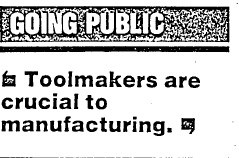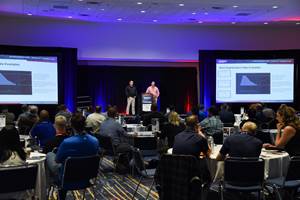Tools of the Trade Aren't Being Passed On
An earlier editorial of mine on "moldmaking in the mainstream" actually got some readers to share their point of view on the subject. Here is one I thought I'd share.

An earlier editorial of mine on "moldmaking in the mainstream" actually got some readers to share their point of view on the subject. Here is one I thought I'd share from Charles Orlowek from Chicago, Illinois.
Charles writes, "I'm wondering if part of the challenge for manufacturing stems from a growing distaste for middle class jobs of various kinds. You're right, kids today don't feel manufacturing is exciting, but is excitement why kids ever went into the field--even two or three generations ago? There are so many good, well-paying middle class jobs that are often tedious and difficult for employers to fill. Why? I wonder if it's because so many people today need to feel passionate about what they are doing all the time. Do you think many of them simply do not find it tenable to prepare for a solid, if somewhat boring, middle class job, unwilling to defer the pursuit of passionate interests and hobbies to their time off?"
On this he recommmends reading a commentary entitled "Quiet Airports for Thanksgiving."
Charles also refers to an early 1990s news story from Crain's Detroit Business that he saved called, "Tools of the Trade Aren't Being Passed On." The first sentence reads: "Meetting in Chicago one day in 1990, a roomful of toolmakers was asked a simple question. Who would encourage their children to follow in their own career footsteps? Among the more than 50 toolmakers present, not a single hand went up. If toolmakers themselves weren't providing encouragement, how could schoolteachers and guidance counselors be expected to?"
Charles goes on to ask, "Could those highly skilled workers of a generation ago have thought their kids would do better by pursuing other lines of work? Ironically, it's now those children of the nineties who instead face diminishing prospects for their generation. One important reason seems to be the collapse of employment in manufacturing trades and other typically middle class work. Many openings exist, but without a commensurate number of willing and qualified candidates, a high number of these openings will not be converted into real jobs, filled by real people.
"Aside from image issues with manufacturing, is the appeal of middle class work itself waning? In the 1980s, computer science was still a frontier, and the number of degrees earned in U.S. institutions spiked. The field still attracts visionary people wanting to remake the world, with no shortage of the highly talented wanting to work for Google, or improvise a business model for a new communication advertising platform.
"But what about middle class jobs writing and testing software code for process control? What about the legions now needed for the day-to-day work of securely operating and maintaining information systems at the heart of our factories, as well as transportation networks, power plants, and pretty much all public and private infrastructure?
"In the frontier days of 1985-86, years before the Internet was in wide use, U.S. colleges and universities awarded 42,337 bachelors degrees in computer science. Later, the dot.com boom temporarily pushed those numbers even higher. The figure for the 2010-11 school year? Just 43,072.
"Now comes word that Mary Barra, daughter of a die maker, started her General Motors career in manufacturing and engineering roles and has been named the company's CEO. Hopefully, a lot of today's manufacturing people can now rethink the kind of life to which their children could aspire, and maybe even encourage some to prepare for technical roles in the productive and competitive economy."
Related Content
MoldMaking Conference Session Spotlight: Data
Want to learn about digital workflows in mold design or ERP or global mold monitoring and asset management or the impact of tooling digitalization?
Read MoreU.S. Economic Fundamentals Impacting Moldmaking
The economy continues to downshift, capping growth in moldmaking.
Read MoreThink Safety: Eliminate Hazards Throughout the Shop
The tooling community is taking advantage of new products for safer mold shops and molding facilities.
Read MoreShift in U.S. Mold Imports: Emerging Countries Gain Ground in Market Share
The dynamic nature of the U.S. mold industry's global trade landscape offers challenges and opportunities for growth.
Read MoreRead Next
Are You a Moldmaker Considering 3D Printing? Consider the 3D Printing Workshop at NPE2024
Presentations will cover 3D printing for mold tooling, material innovation, product development, bridge production and full-scale, high-volume additive manufacturing.
Read MoreHow to Use Strategic Planning Tools, Data to Manage the Human Side of Business
Q&A with Marion Wells, MMT EAB member and founder of Human Asset Management.
Read MoreReasons to Use Fiber Lasers for Mold Cleaning
Fiber lasers offer a simplicity, speed, control and portability, minimizing mold cleaning risks.
Read More




















